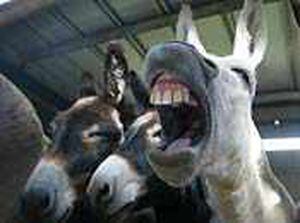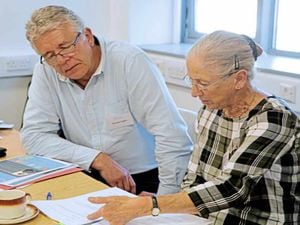Local hero
What makes you local? It's one of the oldest conundrums of all time round these shores and generations of incomers and marriages have only made the puzzle harder. Suzanne Heneghan goes in search of some pointers... straight from the donkey's mouth.


IF GUERNSEY had national treasures, George Torode would be safe under lock and key in Castle Cornet.
The author of the island's celebrated donkey books is one of its favourite sons – as well as a never-ending fount of local knowledge.
To the untrained ear, his gentle tales of Guernsey culture and characters may seem a mere stroll down memory lane.
But mark his words – they're essential reading for anyone out to earn their Guern stripes.
So who better to provide the low-down on being local than George: a walking, talking oracle on his native subject? Forget housing licences and labour utilisation strategy groups, just take his donkey test to see where you rate on the Sarnia scale – but more of that later.
The first test for any 'grockle' (which, having been here for only eight years, includes me) is finding George's house.
In true Guernsey fashion, there is no number, rhyme nor reason involved: just a tiny, hard-to-spot wall plaque bearing a name that even he can't remember the story behind.
When I eventually leaf through to the correct Perry's Guide page and arrive at his St Andrew's home, the donkey man is waiting on the doorstep with a welcoming smile.
He's also brimming with ideas for me to write about.
Do I know Guerns say 'bathers' instead of swimming trunks? is his first question as he ushers me through to the family kitchen. And how about that 'pumps' are plimsolls around this neck of the woods? Baoncetchus (pronounced 'boonchus') are somersaults.
Oh, and a budloe is a Guy Fawkes?
George is clearly on a roll and already out to prove you can't fool a Guernseyman about your parentage.
'Right, you're not from here, that's obvious,' he says after watching my terrible parking. 'But even if you pretended, I'd easily find you out.'
'Go on then,' I challenge him.
'Okey-dokey,' says George – using a local vernacular that has already thrown me. 'If I said to you, what does "modlyotpond" mean?, you wouldn't know what I was talking about, would you?'
'No idea,' I confess, before kicking myself (donkey-like) as I realise he means the landmark water feature in front of the Yacht Club.
'You see, being a Guern isn't something you learn overnight,' chuckles George. 'I bet you thought it was strange when someone first asked you to meet them at a modlyotpond, didn't you? That's because you have to be part of life here to pick things up. There's no short cuts.'
The uniqueness of his native isle's place names and pronunciations is something George first realised during his earlier years as a taxi driver. 'Visitors were always amused or confused by something. A big regret is not writing down a list of things I heard a man rattle off to his English friends when we collected them from the airport.
Some are obvious, but others are things most of us don't even realise are out of the ordinary.
'It must be a shock for some tourists at first. For a start, hire car firms should tell them it's OK to mount the kerb if they have to.
I'll often see these poor visitors just sitting in their cars, looking helplessly at lorry drivers, wondering if our roads are designed for two-way traffic.
'Most cope well with the filter-in-turn system, though. That's a very good Guernsey thing,' he says proudly. 'It would never work in England – everybody there drives at 90 miles an hour.'
As any new grock on the rock will tell George, pronouncing the island's Gallic-esque street names is usually the first and biggest challenge.
Basically the rule seems to be, forget everything you ever learned in your school French lessons. Yes, I know it looks as though it should read 'the Bo-ay' but try pronouncing the Bouet that way down the pub and you'll be laughed out of the Friday night meat draw (another local custom that tends to take unsuspecting vegetarians by surprise).
And it's not just Guernsey place names that can leave you high and dry: there's a whole new sentence structure to get your tongue around.
Unsurprisingly, local legend George has an explanation for it: he reckons French grammar is at the root of it all.
'When a Guernseyman asks you, "Where you to, eh?" – as they often do – he's anglicised the words but not the grammar,' explains George.
'It's the same with, "I'll tell you for why", which is based on pourquoi.
'Also, there's, "I saw him to the pictures". That simply means that I met him at the cinema,' smiles George, as if all this is the easiest concept in the world to understand.

'Don't worry, you'll get the hang of it after a few more years,' he laughs. (Yes, but how many more, George?)
'What about "izit"?' I challenge. 'That's a pretty confusing response to give someone.'
'Yes, that's a good old Guernsey one,' beams George. 'A real islander will always answer you with "is it?" no matter what you've said.'
In fact, according to George, one of the first things you would notice about a genuine Guern is how they turn statements into questions, often through that much-used local enquiry, 'eh?'.
'When someone says something like, "I'm telling you the truth, eh?", that's real Guernsey speak,' says George. 'It's nice, I think, because it softens the sentence and invites a response. And we Guerns always want a response.'
Although a true islander whose family stretches back to the 1300s, George does not speak the native patois. But he is keen to see the historic language survive. 'It's something that remains strong in the upper parishes and they're keeping it alive. I hope the younger ones stay interested too.'
He's also more than happy to be a 'donkey', viewing the description as a compliment: a nod to an impressive national trait, rather than an insult.
Although he's no real idea where the nickname came from, many believe it's because of islanders' ability to survive and hold on to independence over the centuries.
'We know how to dig our heels in and are strong enough to have come through,' he says.
'If I'm ever asked if I'm insulted with the name, the answer is an absolute "no".
'It's something to be proud of – it shows our never-say-die character. A Guernsey person is optimistic. Their glass is always half-full, not half-empty.
'Besides, I'd rather be a Guernsey donkey than a Jersey crapaud.'
I wondered how long it would take to get around to 'the other island'. Despite the undisguised rivalry between Guernsey and Jersey, George insists it's a friendly one. He even admits to hopping across now and then to see the neighbours.
'It's not a betrayal,' he quickly protests. 'Lots of Guernsey people go to Jersey ... we just always make sure we can get back,' he laughs. 'Guernsey is always the best place to be.'
Which brings us neatly on to George's donkey books. Like love letters to his homeland, he wanted to make sure the stories and tales were committed to print so local characters are never forgotten. 'I write mostly about ordinary people who have no reason to be remembered as far as making a big song and dance about anything goes – but who sum up what life is like in Guernsey.
'Some would call them salt-of-the-earth types and that's the best way to describe them. They're not all eccentric or anything like that, they're just good fun.'
One such character was George's late mate Reggie Lamb. 'You'd spot Reggie and straightaway he'd make you laugh. Like the time I saw him one morning and he was obviously in the mood for a joke.
He was in his lorry and decided to stick his leg out of the window for an indicator to give the other motorists a laugh.
'That was Reggie all over. And in a way that story kind of sums up the books.
They aim to preserve an idyllic view of Guernsey.
A bit like how Enid Blyton created a cosy world you could escape into. That's what I wanted to do.'
Back in the real world, George accepts things are changing, thanks to progress and migration.
'It's inevitable really, but a bit sad.
I think the country parishes are maintaining the Guernsey outlook.
Genuine Guerns don't want the island to change beyond recognition. In fact the average, older Guerns probably don't want to see the island grow much more. We'll lose all the characters because a lot of the community spirit will go.'
He believes some are already disappointed at the rate of progress over the last 50 years. 'Perhaps looking back, some of us think that being so welcoming was naive. But if we had to do it all over again, I think we would, because that's how we are: welcoming.
'Besides, there are a lot of people who have come and stayed and done some great things for Guernsey.'
Which leads us on to the million-dollar question: when does an incomer become a local?
I set the question against a true story I'd heard of how one man who arrived here as a six-month-old baby still gets ribbed about not being local.
'Well, that's just a bit of friendly joking,' explains George. 'And it's not that simple, really. I don't see people as non-islanders – more as "adopted Guerns".
'My own feeling is that if a person loves the island as we do, stands their round down the pub and can accept having their leg pulled, then it doesn't matter where they were born: they fit in.'
George agress that the limited size of the island can sometimes make it hard for incomers to settle, agrees George.
'It's not always easy to keep things private here and I think that's a thing new people find hard to deal with at first.
'But on the plus side, it's great that people know each other.
'We're a good lot to live with. We know what's going on, we know our own minds and we love having a laugh and a joke.'
Talking of which, as I'm bidding farewell, the island expert suddenly remembers something else and beckons me back up the path. 'By the way, I've a good story for your newspaper. Have you heard there's a new Rastafarian pop group in Torteval?' 'Really?' I ask, scrambling to get my notebook back out.
'Yes. They're called Bloney M,' he laughs.
Nice one, George.
Seems I've still a fair way to go for those Guern stripes.
How Guernsey are you?
Try George's test to see how you measure up.
1. What does the phrase, 'the person has got property in Sark', mean?
2. If someone said they had to rush off to put up the trimmings, what would they be talking about?
3. What does a 'feed of ormers' mean?
4. What do Guernsey mean when they talk about a chip basket?
5. What do islanders mean when they refer to 'the Intermediate'?
Answers:
1. They have a turn in their eye.
2. Putting up the Christmas decorations.
3. Around a dozen ormers – enough to help rustle up a family meal.
4. They're referring to the chipwood containers once used to send tomatoes to England.
5. The old Grammar School.





